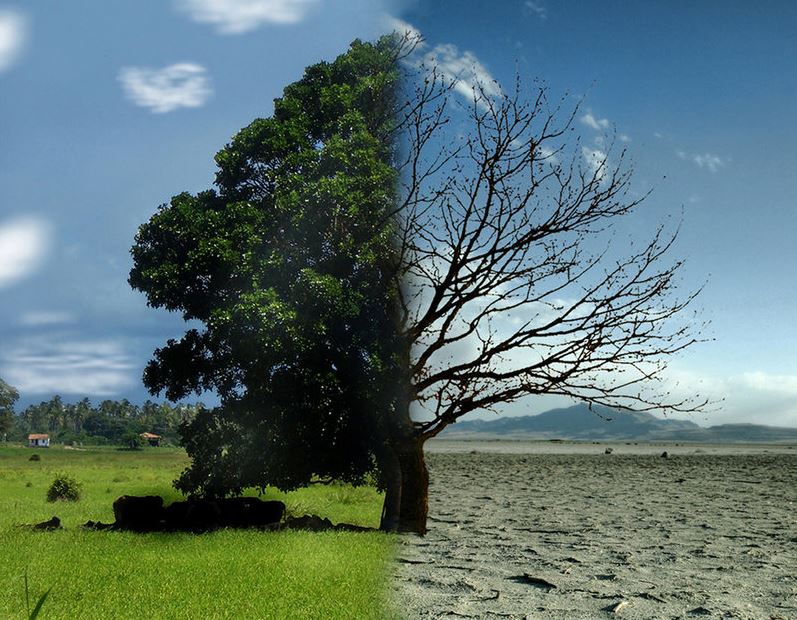Unless bold action is taken now, there is a 10% risk that the Earth’s temperature will rise by 6°C by the year 2100, a group of leading climate researchers has warned in an ‘Earth Statement’. If this were to happen, the consequences for human civilization would be ‘unimaginable’, say the Earth League experts.
Decision-makers across the globe need to take action now in order to pave the way for a successful international agreement to minimize the risk of devastating climate change, seventeen of the world’s leading scientists emphasized.
They spelled out, in eight essential elements, what the international climate agreement in Paris at the end of this year should achieve in order to provide us with a decent chance of avoiding dangerous climate change.

Unless bold action is taken now, it will be too late, say 17 leading scientists.
Zero-carbon society by mid-century
The first and fundamental element is a serious, global commitment to aim for global warming below 2°C, which would require a transition to a zero-carbon society by 2050.
Johan Rockström, Chair of the Earth League, Executive Director of the Stockholm Resilience Centre and board member of the Global Challenges Foundation, said:
“The window of opportunity is closing fast. We are on a trajectory that will leave our world irrevocably changed, far exceeding the 2° Celsius mark. This gamble risks disaster for humanity with unmanageable sea-level rise, heat waves, droughts and floods.”
“We would never consider this level of risk in any other walk of life, yet we seem prepared to take this risk with our planet. Conversely, the scientific evidence shows that we can create a positive future but only with bold action now.”
“The science, the economics and the moral imperative to protect our planet all demand this action. We are calling on policy-makers to show real leadership and commit the planet to a sustainable future.”
We must avoid crossing tipping points
Their Earth Statement was released today to coincide with Earth Day. It warns of the risk of crossing tipping points – lines in the Earth system that once crossed are either extremely difficult or impossible to reverse.
The statement highlights recent research suggesting that significant ice melt in parts of Antarctica may already be irreversible, which provides evidence that our societies need to take a precautionary approach to alter the global climate.
Earth Statement co-author, Professor Jeffrey Sachs, Director of the Earth Institute at Columbia University, said:
“COP21 is the moment of truth: the last chance to stay within the 2° Celsius upper limit. The key to success is deep decarbonisation by mid-century. Our studies show that this can be accomplished, at modest cost, and with a significant improvement in the quality of life.”
“Success will require a shared global vision, strong national commitments, and global cooperation on technology pathways.”
Eight essential elements
The statement highlighted the following essential elements of climate action:
1. Governments across the world need to put into practice their commitment to limit the temperature rise to 2°C “in order to limit unprecedented climate impact risks.”
2. The global agreement must be based on the remaining global carbon budget – the limit of what we are still able to emit in the future – which needs to be well below 1000 GtCO2, to have a fair chance of holding the 2°C line.
3. Nations must commit to deep de-carbonization, beginning immediately and leading to a zero-carbon society by the middle of this century, or shortly thereafter. “This will require a fundamental transformation of the economy.”
4. Equity is crucial. Every nation must formulate an emissions pathway consistent with deep de-carbonization. Advanced economies and progressive industries can and should take the lead in de-carbonize well before 2050.
5. In order to unleash a wave of climate innovation, we must have targeted research, demonstration and diffusion (RDD&D) of low-carbon energy systems, as well as sustainable land use.
6. “The agreement should provide the starting point for a global strategy to reduce vulnerability, build resilience and deal with loss and damage of communities from climate impacts, including collective action and scaled-up support.”
7. There needs to be global agreement to safeguard carbon sinks and essential ecosystems, such as forests, which is as important for protecting the climate as emissions reductions.
8. National governments need to urgently realize new scales and sources of climate finance for emerging economies to enable our rapid transition to zero-carbon, climate-resilient societies.
Johan Rockström and John Schellnhuber, fellow Earth League member and director of the Potsdam Institute for Climate Impact Research, are to present the Earth Statement at the 4th Nobel Laureates Symposium on Global Sustainability in Hong Kong on Thursday, 23 April.
The Earth League Members are:
Chair: Johan Rockström, Stockholm Resilience Center, Sweden.
Carlos Nobre, National Institute for Space Research (INPE), Brazil.
Guanhua Xu, Chinese Academy of Sciences, China; Additional author (not EL member).
Guy P. Brasseur, Max Planck Institute for Meteorology, Germany.
Hans Joachim Schellnhuber, Potsdam Institute for Climate Impact Research, Germany.
Jeffrey Sachs, The Earth Institute, Columbia University.
Jennifer Morgan, World Resources Institute, USA.
Leena Srivastava, TERI University, India.
Lord Nicholas Stern, Grantham Research Institute on Climate Change and the Environment, London School of Economics and Political Science, UK.
Mario J. Molina, Centro Mario Molina, Mexico.
Nebojsa Nakicenovic, International Institute for Applied Systems Analysis and Vienna University of Technology, Austria.
Ottmar Edenhofer, Mercator Research Institute on Global Commons and Climate Change, Germany.
Pavel Kabat, International Institute for Applied Systems Analysis, Austria.
Peter Schlosser, Earth Institute, Columbia University, USA.
Sir Brian Hoskins, Grantham Institute – Climate Change and the Environment at Imperial College London, UK.
Veerabhadran Ramanathan, Scripps Institution of Oceanography, San Diego (UC), USA.
Youba Sokona, The South Center, Switzerland.
Video – Earth Stewardship
This Imperial College London video was recorded in 2013 during the offical launch of the Earth League, with an Inaugural Lecture by Professor Johan Rockström, hosted by the Grantham Institute for Climate Change.
